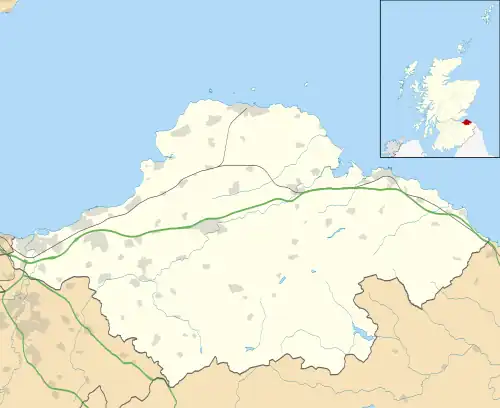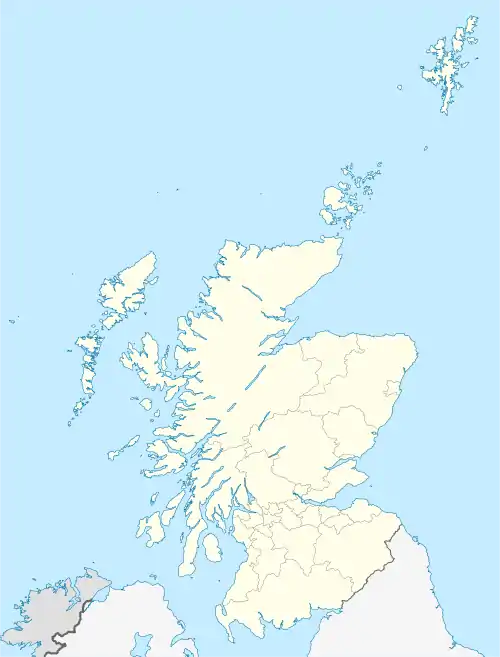Elphinstone, East Lothian
Elphinstone is a village in East Lothian, Scotland. It lies 1.6 miles (2.6 km) south-west of Tranent on the B6414, and 1.24 miles (2.00 km) north-west of Ormiston.[2]
| Elphinstone | |
|---|---|
.jpg.webp) The village shop in Elphinstone | |
 Elphinstone  Elphinstone Location within Scotland | |
| Population | 590 (mid-2020 est.)[1] |
| OS grid reference | NT396702 |
| Council area | |
| Lieutenancy area | |
| Country | Scotland |
| Sovereign state | United Kingdom |
| Post town | TRANENT |
| Postcode district | EH33 |
| Dialling code | 01875 |
| Police | Scotland |
| Fire | Scottish |
| Ambulance | Scottish |
| UK Parliament | |
| Scottish Parliament | |
Etymology
There is a fairy story about a witch called Meg who is supposed to have been involved in the naming of the village. Meg had servants who were elves and she was cruel to them. One day she went to the burn inbetween Elphinstone and Ormiston and ate in her carriage, telling her servants not to disturb her. One elf broke into her carriage once she fell asleep and stole some of her leftovers. Meg, however, awoke and caught him. She took him back to Elphinstone and trapped him in her stone or "Meg's chuck". Hence the name Elph (elf) in stone.[3] Other theories about the origin of the name are from the Anglo Saxon elfenne added to "stone", a reference to hard flint-like stones which were supposed to be used as shot by elves and fairies and which are found on the land around the village.[4] A more prosaic origin is in the Gallo-Latin personal name Alphinus. The earliest mention of the village was in a deed drawn up by Alams de Swinton around 1235 which mentions "homines (serfs) of Elfinstun".[5]
It may be worth noting that Elffin was a relatively common name in the Brythonic Hen Ogledd, with three separate people of that name appearing in the genealogies: Elfin son of Urien, Elffin son of Owain and Elffin son of Gwyddno, the last of which also appearing as Taliesin's foster father in the mythological stories of his life.
History
The Protestant reformer George Wishart was brought to Elphinstone by Patrick Hepburn, 3rd Earl of Bothwell en route to St Andrews where he was tried and burned at the stake on 1 March 1546.[6]
Between 2011 and 2018 the population of the village increased from 520 to 590[7] and it has basic amenities, including a primary school, a community centre, a newsagent, and a miners welfare club.[8]
Landmarks and economy
.jpg.webp)
Located half a mile west of the village, Elphinstone Tower, built in the 13th to 15th century, is a former five-storey tower, now a ruin, with only the lower level remaining.[9] The Elphinstone clan held the lands of Elphinstone and took their name from their lands.[10]
Mines owned by the Edinburgh Colliery Company, Limited were formerly the main employer in the village. Many of the houses in the village were owned by the company.[11] now Inveresk Research International is one of the main employers in the area. Elphinstone Tower Farm produces cereal crops.[12]
References
- "Mid-2020 Population Estimates for Settlements and Localities in Scotland". National Records of Scotland. 31 March 2022. Retrieved 31 March 2022.
- "Where is Elphinstone?". www.roadonmap.com/uk. Retrieved 1 March 2020.
- Tim Porteous (15 September 2018). "Tim's tales: The origin of 'Megs Chuck' in Elphinstone". East Lothian Courier. Retrieved 1 March 2020.
- "Origin of the name ELPHINSTONE". Geneanet. Retrieved 1 March 2020.
- "Last name: Elphinstone". Surnames DB. Retrieved 1 March 2020.
- R W Cargill. "Torchbearers of the Truth: George Wishart (1513-1546)". Believers' Magazine. John Ritchie Ltd. Retrieved 1 March 2020.
- "Elphinstone in East Lothian (Scotland)". www.citypopulation.de. Retrieved 1 March 2020.
- "Tranent and Elphinstone Community Action Plan 2014-1019" (PDF). www.coalfieldsregen.co.uk. Retrieved 1 March 2020.
- "Elphinstone Tower". Historic Environment Scotland. Retrieved 1 March 2020.
- "Elphinstone". Scotweb Marketing Ltd. Retrieved 1 March 2020.
- "Lothians Housing Evidence given by Robert Brown". Scottish Mining Website. Retrieved 1 March 2020.
- "Elphinstone Tower farm" (PDF). Savills. Retrieved 1 March 2020.